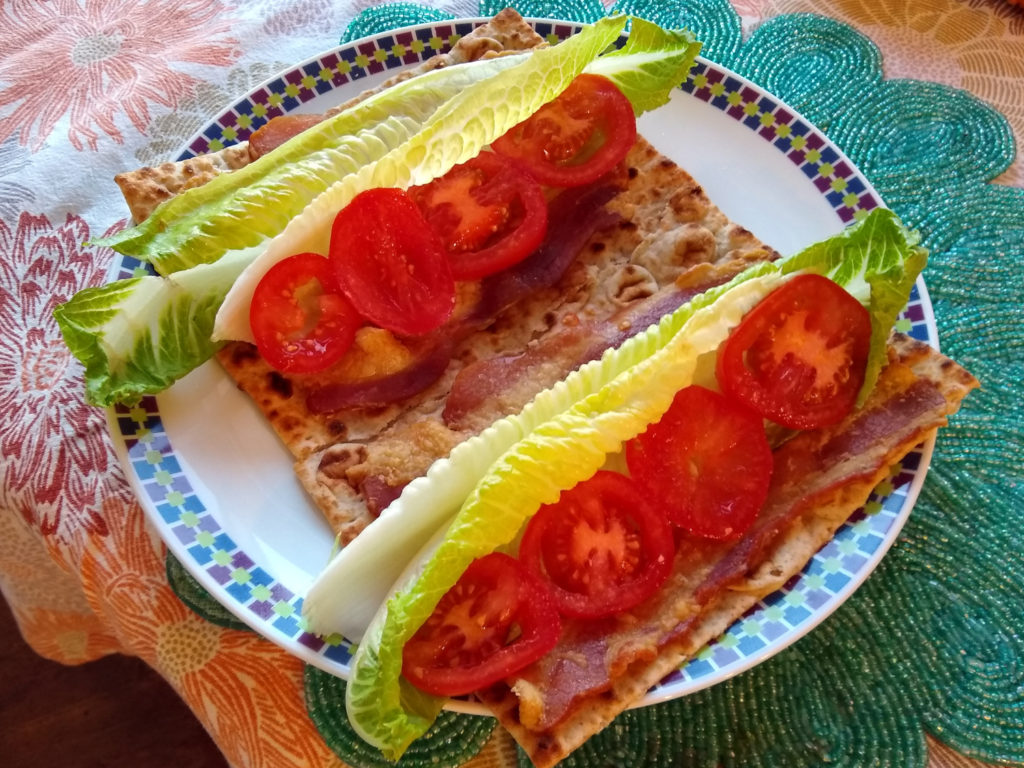Once you have decided to think thin, what would that mean? What would it look like?
For one thing, it means you put controlling your body’s weight first, before all other food considerations. An example: I spent time with family recently. A polite and gracious family person, who puts his family first (like I was raised to do) would eat dinner with everyone else, and maybe try to be guesstimate how much food they were eating. Did I do that? No. I made a pain of myself insisting on weighing and measuring food, and annoyed everybody counting out calories publicly. Also, I didn’t adjust my mealtimes. If dinner was 8PM, I still ate at 5.30PM. If everybody was sitting and talking about something serious and it got to lunchtime, I got up and left to have lunch. Thinking thin is a value. That’s how you value being thin – putting it first in your life. But there are compensations.

My food intake and calorie count
Breakfast – BLT wraps: 4 slices of oven-fried thick cut Kirkland bacon (280); one whole wheat wrap (110) cut in two pieces; lettuce (0); and tomato (30); horseradish sauce (10)
- 430 calories
Lunch – Big Greek Cafe Famous $5 Gyro Wednesday!!!!!! (600);
- 600 calories
Dinner – roasted pork loin (350); 1.5 whole wheat wraps (160); homemade cucumber dill salad (50)
- 565 calories
Snacking – tea with half and half (80); 4x Kirkland tea cookies (170)
- 250 calories
Total for the day: 1845 calories (limit 1800)
What to put first in your life
In your food life, you can choose the path of weight control and put in first in your life. Done properly, it is a lot of work, but is very rewarding. When done improperly, taking the quick and easy way, it doesn’t work as well and it is not as rewarding. Since it is not rewarding, why are you doing it? Eventually, gradually, you will go back to your old life, old values, old rewards and incentives. The weight you have lost will come back on again.
Having put weight control first in your life, and committed to doing it properly, you should keep a food journal and weigh yourself every week. With that established, other things are less of a priority, but there is still a lot of room for your personal preferences and subordinate priorities. Recall my parable of the woman who ate raw veggies and hummus all day so she could enjoy a big dish of ice cream every night.
“Do what you want, and pay for it.” -Terry Pratchett, and many other people over the years.
Learn about yourself. Maybe three meals per day, properly spaced out, will help you control your weight. Maybe six meals will. Do you need bacon, ice cream, a 3PM tea break? Learn about yourself. Pay attention when you are hungry, when you are breaking your diet. Part of you is trying hard to tell the conscious ego part what is needed. When do you need protein? When will pretzels satisfy you?
All this is different if you have serious health considerations, like diabetes or other metabolic issues you are concerned about. In those cases, your health should be the number one priority, and everything you eat should be checked with the question, “how will this impact my health?” Weight is part of that, but be realistic: health first when needed.
Use your self knowledge to build a lifestyle that you enjoy and which uplifts you. It will be difficult and it will take months. Every time I break my diet, I go through and assign blame. I assign 100% of the blame to my ego, stubbornness, pride, and my tendency to ignore evidence and go with my lazy assumptions. Yes, it’s my favorite trio: greed, laziness, and stupidity. I could write whole essays about that. But I will leave it for another time. My point is, it’s not my body’s fault that I have a bad diet day. Every time so far, the blame has gone to me being stubborn (ignoring hunger signs), lazy (not preparing or thinking ahead, not preparing foods I want to eat), and proud (blinding myself to evidence and coasting on a whim or some mental theory, which might itself be wrong).
All my willpower is spent updating my store of self knowledge, and striving to make my life better. There is none left for dieting, so I don’t diet. Instead, I try to live a better and more fulfilling lifestyle; one which takes work to maintain, but results in weight loss. It is really easy to lose track, slack off, get careless, fall in love with your own ideas instead of paying attention to reality. So don’t do those things. Find a way to make your lifestyle self correcting or at least easy to get back to. Pay attention to when it doesn’t work and figure out what you are doing wrong. You are probably trying to force yourself to obey instead of persuading yourself to collaborate and achieve your goals, using all your parts together in harmony.
Achieve that and the weight will come off! And stay off.
-The Doctor